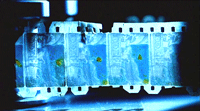One of the aspects of David Gatten’s work-in-progress, avant garde series, The Secret History of the Dividing Line that greatly impressed me was the idea of film splicing as an intrinsic act of violence, and that innate in this process of “traumatic creation” is the sculpting of a kind of liminal, alien landscape that is only visible within the single frame. So it was particularly satisfying to see that seminal Belgian filmmaker André Delvaux had a similar preoccupation with respect to the fragility and materiality of the medium, and an appreciation for the unexpected art that is created in the process of manipulating found film in what would turn out to be his final opus, 1001 Films, Delvaux’s reverent and affectionate ode to film preservation. Returning to his familiar, elegant framework of exploration, imagination, and dissociated reality, Delvaux presents the painstaking process of film archiving and restoration through the filter of adventure and mystery, as a night-time visit to a seemingly depopulated repository (presumably the Royal Film Archive of Belgium) turns into an atemporal wonderland of novel discoveries, hidden treasure, re-awakened curiosity, and critical re-assessment. Delvaux juxtaposes a series of evocative images of observation, reconstruction, and projection using film fragments – from the hand-painted, altered image frames of Georges Méliès’ Kingdom of the Fairies to the iconic image of Louise Brooks – with the erratic texturality and uneven contrast of the disintegrating film stock to create a thoughtful and resonant nocturne to film as an articulate, but ephemeral social testament of magic, wonderment, dreams, and seduction.
© Acquarello 2006. All rights reserved.
